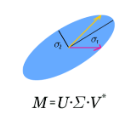This paper studies the extreme singular values of non-harmonic Fourier matrices. Such a matrix of size $m\times s$ can be written as $\Phi=[ e^{-2\pi i j x_k}]_{j=0,1,\dots,m-1, k=1,2,\dots,s}$ for some set $\mathcal{X}=\{x_k\}_{k=1}^s$. Its condition number controls the stability of inversion, which is of great importance to super-resolution and nonuniform Fourier transforms. Under the assumption $m\geq 6s$ and without any restrictions on $\mathcal{X}$, the main theorems provide explicit lower bounds for the smallest singular value $\sigma_s(\Phi)$ in terms of distances between elements in $\mathcal{X}$. More specifically, distances exceeding an appropriate scale $\tau$ have modest influence on $\sigma_s(\Phi)$, while the product of distances that are less than $\tau$ dominates the behavior of $\sigma_s(\Phi)$. These estimates reveal how the multiscale structure of $\mathcal{X}$ affects the condition number of Fourier matrices. Theoretical and numerical comparisons indicate that the main theorems significantly improve upon classical bounds and recover the same rate for special cases but with relaxed assumptions.
翻译:暂无翻译





